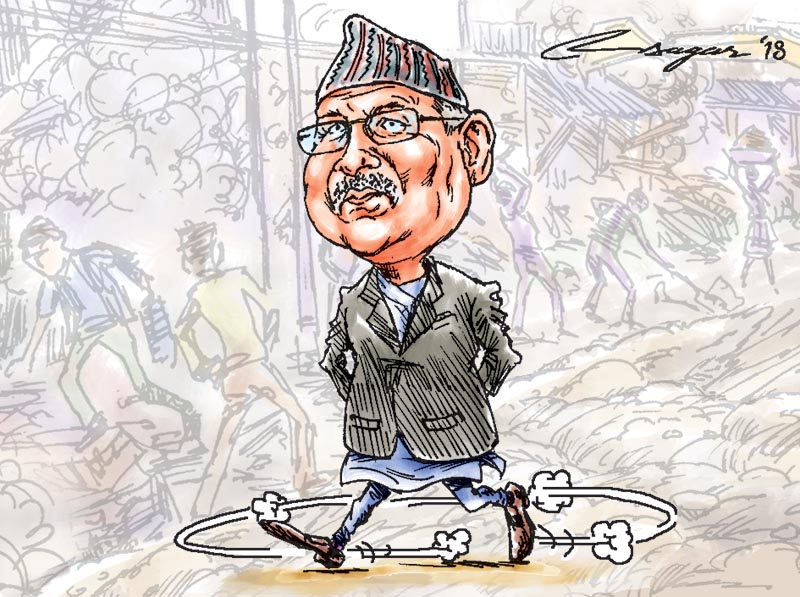Oli’s Achilles heel: His thin skin, big ego
Spontaneous outpouring of public anger is not conspiracy. It’s called awakening. PM Oli should fix the existing problems rather than complain. It’s up to him whether he wants to leave a legacy behind or be remembered as a PM who talked trash
Some see him as a witty person with traits of a stand-up comedian, who generally prefers to coin “absurd” ideas and make tongue-in-cheek remarks that prompt even his opponents to crack a smile. Others see him as a dedicated leader, who is not corrupt and willing to take risks to create a prosperous Nepal and leave a legacy behind.
However you see him, he’s our prime minister and he will remain so in the near future, as he has the backing of over two-thirds of lawmakers in Parliament, which makes him the strongest premier since democracy’s restoration in early 1990s.
KP Sharma Oli became Nepal’s prime minister at a time when Nepalis were craving for a strong and stable government. Nepal saw frequent government changes in the last two-and-a-half decades, which weakened bureaucracy, created policy uncertainty, fostered corruption and affected development works. These reasons prevented Nepal from escaping the low-income trap.
So, it was natural for many to be elated when Oli took reins, as he had intensely pushed the agenda of economic prosperity during election campaigns.
Oli started his job in mid-February on a high note, showing signs of making a complete departure from traditional governance practices marred by patronage and partisanship. The first few persons that he roped in his Cabinet drew accolades, as they were “clean figures”. His government also waged a war against cartels that were preventing free competition in the public transport sector, went after gold smugglers and contractors delaying construction of public infrastructure projects, and strengthened ties with both India and China.
Then the momentum began to fizzle out, especially after his trip to India and China. After these visits, Oli started selling big dreams of building inland waterways to operate ships and connecting both the neighbouring countries with railway network. He was so obsessed with this idea that he started talking about it wherever he went. This did not go down well with people, who were being forced to travel on dusty or waterlogged roads filled with potholes. Soon public retaliated, stating the PM should focus on small things like repairing roads and sewage system, eliminating dust and building basic infrastructure like bridges rather than harping on things that would take years to build.
Instead of acknowledging the government’s shortcomings, the PM sniped back stating his government had inherited bad roads and infrastructure from the previous government led by Nepali Congress (NC). There is no doubt that NC had disappointed people in many instances. That’s the reason why it got snubbed during elections, enabling Oli’s party to muster overwhelming public support. But instead of righting the wrongs and delivering results, he’s now pointing fingers and shirking responsibilities. This failure to take ownership is the biggest weakness of the incumbent government. And this weakness stems from suspicion that “public anger is not spontaneous but carefully implanted by his opposition”.
Over the months, the PM has started seeing every spontaneous outpouring of public anger as a conspiracy hatched by his opponents to bring down the government. Look at the way he reacted after hundreds of people marched through the streets of Kanchanpur to protest rape and murder of 13-year-old Nirmala Panta. And look at his reaction after thousands of people rallied behind Dr Govinda KC, who had launched his 15th fast-unto-death demanding reforms in the medical education sector.
In both the cases, PM Oli trumpeted vitriol, claiming people had been provoked by his opponents, especially NC, which was not exactly the case. PM Oli must understand that people express anger in public when they feel they are being taken for a ride. This is called awakening and it reflects people’s frustration.
People get frustrated when there is “unfair inequality”. We all know what inequality is; and it cannot be prevented even if equal opportunities are provided. This means people will accept their fate if someone has outperformed them because of grit, hard work and innovative ideas. But if they know the playing field has deliberately skewed to pave the way for some groups to reap undue benefit, they retaliate.
To get a sense of “unfair inequality”, drive from Kalanki to Nagdhunga and from Chabahil to Jorpati. Travelling on these routes gives one a feeling of passing through a disaster zone because of bad road condition and plume of dust. This has affected movement of ordinary jobholders, who must travel on the road everyday to earn a living, hit business of shop owners, reduced movement of tourists, created problems for cargo movers, reduced life of vehicles and increased fuel consumption. All these people and businesses are suffering because contractors, who have pocketed taxpayers’ money, are taking advantage of their proximity to political leaders to not complete the tasks. Isn’t this unfair inequality? And don’t people have the right to protest this?
This is just one example. There are numerous other examples in education, health and judiciary sectors that have created unfair inequality. This has reduced people’s trust in the system. The PM should fix this rather than complain. Does he want to leave a legacy behind or be remembered as a PM who talked trash?






